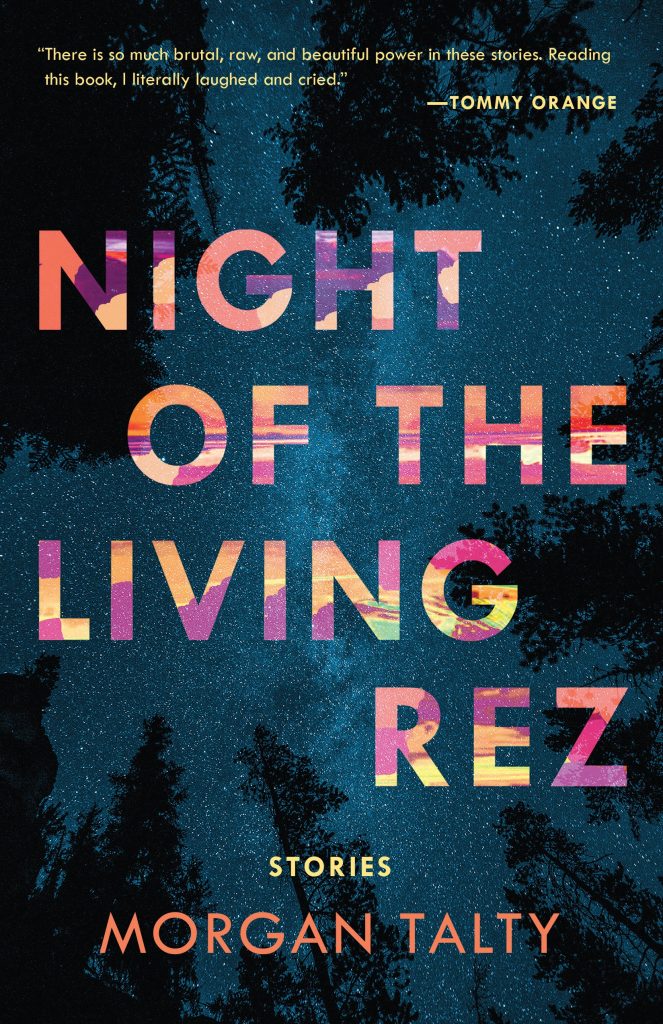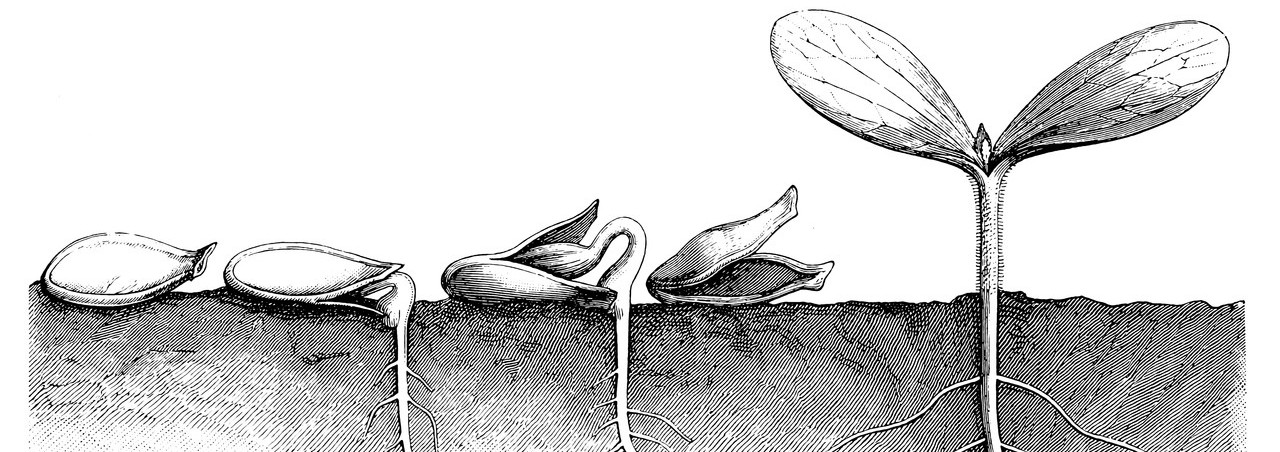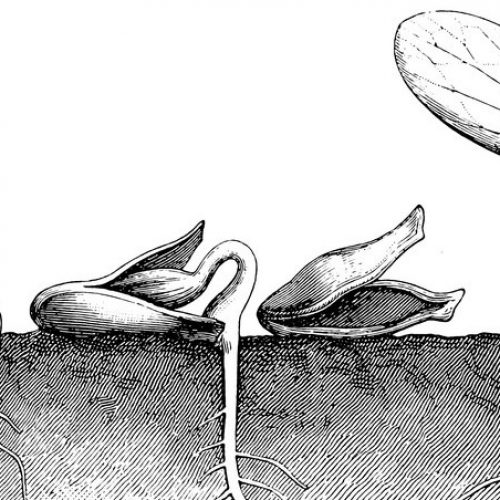I discovered Morgan Talty’s work a few months ago when I saw his name frequently appearing on all the highly anticipated book release lists that come out at the start of each year. I bookmarked some of his stories and read each one gradually, on my dimmed phone screen during late-night nursing sessions with my newborn baby. Even in my sleep-deprived state, I was hooked. So, when the time came for me to reach out to writers for this year’s Radicle interview, the choice was easy. Morgan was gracious not only in his acceptance of the interview but also in all his responses to my questions. I was humbled by his love of the human spirit—it is evident, too, in the stories that make up his forthcoming collection Night of the Living Rez. The following interview was a delight to put together, and I encourage you to pre-order Morgan’s book here.
~Basmah Sakrani, Radicle Interviewer
Basmah Sakrani: In botany, the radicle is the primary root, the first organ to appear when a seed germinates. It grows downward into the soil, anchoring the seedling, as secondary roots grow laterally. What do you consider to be the radicle of your writing career?
Morgan Talty: I’d have to say the Greyhound Bus. During the summers, I took the bus to visit my dad for the summer, and it was on that road to Connecticut that I had time to really think about what I’d miss back home during the summer but also what I’d gain by being with my father and our family on Myron Avenue. It got me thinking a lot about stories—ones I knew, ones I imagined happening while away—and exposed me to all kinds of stories, both at my father’s but also on that bus. I suppose those secondary roots, the ones that grow laterally, are Myron Avenue with my father and Penobscot Nation with my mother and family and friends. It was the culmination of all those stories—and longing, too—that got me writing.
Basmah Sakrani: Looking back at your writing radicle, what do you wish you’d known then about your writing career that you know now?
Morgan Talty: I wish I knew more about patience. Writing takes so much time and persistence, but as a young writer I would get easily swept up in the idea that if I didn’t publish, I was failing to be a writer (which led to so much anguish). But now, after publishing and being part of the literary community, I know it’s not about that—it’s about the writing, putting in the time, and being patient with yourself. Too much pressure can hurt you mentally—spiritually—and so knowing your process and respecting it is important.
Basmah Sakrani: Can you share a little bit about your writing process with us?
Morgan Talty: My process always varies depending on the project, but in its most simplest form, it’s this: I sit down and write. And get up and pace and think. That’s always the constant in my writing process. But some stories demand different approaches. If I’m revising, sometimes I’ll do it all on the computer, whereas other times I’ll print a hard copy and sit on the couch, my laptop in the kitchen, and as I make marks on the hard copy—as I get ideas that can open up the story—I’ll rush to my computer to try it out, and then it’s back to the couch. I’m also a morning writer—that’s when I feel I write best. When I’m working on a large project—say, a novel—I tend to generate/rewrite in the morning, and then edit in the evening.
Basmah Sakrani: I came across your contribution to A Year in Reading for The Millions and I was sorry to read about your mother’s passing. I lost my older brother in 2010 and it wasn’t until maybe a few years ago that I felt I could write about him. In Night of the Living Rez, the bond between David and his mom is so palpable, so tender – I wonder, was this inspired by the relationship you shared with your mother?
Morgan Talty: Thank you for your condolences, and I’m sorry to hear about the passing of your brother in 2010. That pain lasts and lingers—I lost my father ten years ago, and I still feel it along with my mother’s recent departure. It certainly was inspired by our real relationship. I loved my mother—I was always there for her, even when things were at their worst. And she was always there for me, too. She may be gone, but I feel like she’s still here in so many ways. This book being one of them.
Basmah Sakrani: What I loved about Night of the Living Rez is how it functions. It’s labeled a collection of stories but it functions like a novel to me. There’s a clear narrative for Dee and for David despite the gap of chronological time between their sections. Which of the two was the radicle for this collection and how did you go about assembling it together?
Morgan Talty: I’m so happy to hear you see the story collection as a collection but also as a novel. David was the radicle for this book, but it wasn’t until I discovered Dee that the real story came to life. I had written maybe 15 or 16 stories from David’s perspective—thinking I was going to write a story collection from his perspective and ordered chronologically—but came to find that there was a “so what” missing from the book. Some of the stories were good, but most of them were bland and lacking anything. So I abandoned the project and thought to write something else. I went on to write “Burn,” and when I was developing that character Dee, I didn’t know what to name him. I had been writing from David’s perspective for so long that I wanted to call him David. But instead, I put “D” as a placeholder. The more I looked at the story, the more I tried to think about who this person was, I eventually realized, “Holy &*%$, this is David as an adult.” Then the question came to me: what happened? How did he get here? Those two moments seem like connected radicles. I then started to write stories from Dee’s perspective, working toward answering that question of “what happened?” The David stories were easily organizable since I originally sought to write them in order of age, and then I did the same with Dee, but I had much more flexibility in the order. In other words, I was able to move them around to accommodate that slow build to the end, which brings the book to a close.
Basmah Sakrani: You mention trying to resolve for Dee: how did he get here? What happened? I just re-read Half Life last night where that is the central theme of the story so those questions are very much top of mind for me today. When it comes to your writing journey: if you weren’t where you are now, what else would you be doing?
Morgan Talty: That’s tough! I feel like I’d be that person who just does odd jobs to get by: working for moving companies, working for a town to tend the landscape, driving truck for UPS.
Basmah Sakrani: Night of the Living Rez posits an important question: how do the living come back to life? Will you tell us the answer?
Morgan Talty: We have to love each other, despite how difficult that can sometimes be. We just have to. All we have our are people, our family, the ones that make us who we are.
Basmah Sakrani: In a recent interview, you talked about importance of place and this line really struck me: “The world is as alive as us.” It wasn’t tough to draw a connection between that statement and how you’ve used and upheld the Penobscot language in your book. The language of that world, or maybe the world in that language, is kept alive through you. Does that feel like a burden sometimes?
Morgan Talty: I think I could safely say that it does feel like a burden, but I kind of think that might not be true. I almost wonder if it’s a blessing disguised as a burden. Using what I know of the language comes naturally to me, since words and phrases were used when I was growing up, but I recognize that I’m in a unique position to be able to go further: to add more language to the stories, to find ways to incorporate it not to make the work more “authentic” but instead to create a lasting impression of the Penobscot Language on the broader world, be it pop culture or other places. My grasp of the language is very limited, and I need to be a better student. There’s so much I need to learn.
Basmah Sakrani: Finally, what do you think is the legacy you’re creating with your words? If they are the radicle, what do you hope will sprawl and stem from them?
Morgan Talty: I really hope that this book—this radicle—inspires us and even teaches us how to love each other better, despite the darkness we can find ourselves in.
Read Morgan Tatly’s short story “In a Jar,” published at Narrative, and more here.






